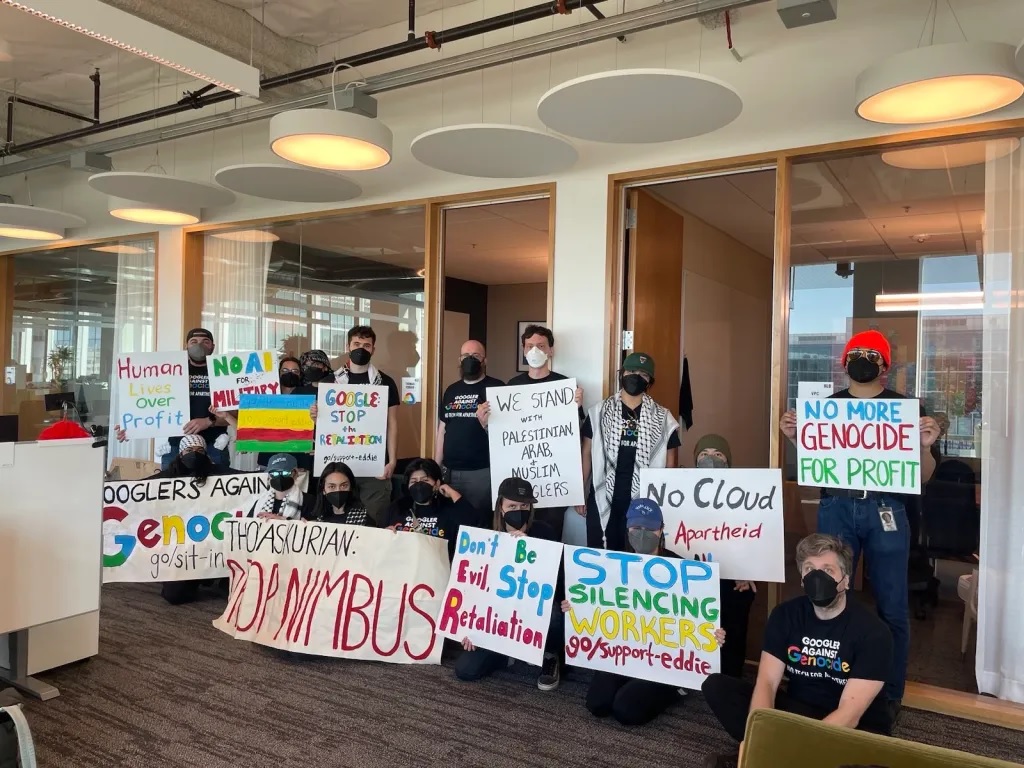|
Getting your Trinity Audio player ready...
|
In a controversial move, tech giant Google has fired 28 employees who participated in a sit-in protest over the company’s cloud computing contract with the Israeli government. The firings have sparked outrage among the tech community and raised concerns about the limits of employee activism within large corporations.
The Protest and Its Aftermath On April 10th, 2024, a group of Google employees staged a sit-in at the company’s headquarters in Mountain View, California, to voice their opposition to the tech giant’s $1.2 billion cloud computing contract with the Israeli government.

The employees argued that the contract, which was signed in 2023, would provide the Israeli government with tools that could be used to surveil and oppress Palestinians.
We cannot in good conscience continue to build technology for a government that is actively displacing and denying basic rights to millions of Palestinians,
said one of the protesting employees, who requested anonymity for fear of retaliation.
However, Google’s management quickly responded to the protest, with the company’s leadership asserting that the contract was a matter of national security and that the employees’ actions were in violation of company policies.

On April 16th, 2024, Google announced that it had terminated the employment of 28 individuals who had participated in the sit-in.
Backlash and Calls for Accountability The news of the firings has sparked a massive backlash within the tech industry and beyond. Many have accused Google of silencing its employees and stifling their right to protest against the company’s business decisions. Some have even called for a boycott of Google’s services, including its search engine, cloud computing offerings, and YouTube platform.
This is a clear violation of workers’ rights and a disturbing trend of tech companies cracking down on employee activism,
said Samantha Liang, a tech policy analyst at the Center for a New American Security.
Google should be held accountable for its actions and must re-evaluate its ethical policies and practices.
The firings have also reignited the ongoing debate about the role of tech companies in global conflicts and their responsibilities to their employees and the broader public. Many have argued that tech giants like Google have a moral obligation to ensure that their products and services are not being used to enable human rights abuses or to support authoritarian regimes.
Google’s Response and the Future In response to the backlash, Google has defended its actions, stating that the terminated employees had violated the company’s policies by disrupting the workplace and engaging in unauthorized political activity.
The company has also maintained that its cloud computing contract with the Israeli government is purely a matter of national security and has no bearing on the Israeli-Palestinian conflict.
However, many remain skeptical of Google’s justifications, and the company’s reputation has suffered a significant blow as a result of the controversy. Some have even speculated that the firings could lead to an exodus of talented employees who are unwilling to work for a company that they perceive as being complicit in human rights abuses.
As the fallout from this incident continues to unfold, it is clear that the relationship between tech companies, their employees, and their social and political responsibilities will continue to be a contentious and critically important issue in the years to come.



